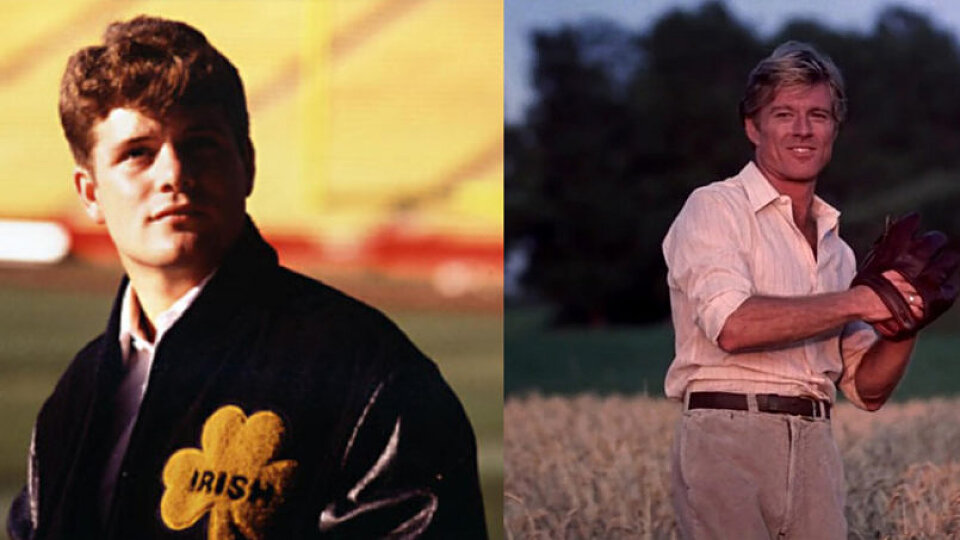On Deciding if You're on the Right Creative Path | Len's Lightbulbs
Should you keep pursuing the career path, or the creative hobby, you’ve been on? Should you start a new hobby or a new vocational aspiration?
I asked this question of myself once, and surprised myself by deciding to abandon the creative path I’d pursued for the previous 10 years. To help clarify what I mean, let me explain introduce you to what I think is a false idea about talent.
According to my baseball exec brother-in-law, many baseball executives believe that talent comes in one of two forms:
- The Gifted – those born with it, like Roy Hobbs in the movie fable The Natural, and
- The Grinders – those who make it on sweat equity, like the football player in the movie Rudy.
Which do you relate to? Understanding the aid, and the limitations, of each image is key to understanding your (a)vocational pursuits.
THE ROY RULE
If what my brother-in-law tells me is true, many baseball executives draw pretty bright lines – they put heavy emphasis on the gift.
Those execs probably believe in The Natural. And after all why wouldn’t they? Some people say it’s the best baseball movie ever made. It’s certainly a cheery myth, and great grist for what is in reality a long, grueling job.
In the film, Roy Hobbs had a clear gift. And having a gift for what you do is absolutely necessary. You can’t get where you want to go without it. Blogger Mitch Joel explains:
…if you practice the electric bass really hard (let’s call is 10,000 hours), my guess is that the vast majority of people will know how to play the electric bass very well, but very few of them will be true bass players. You can practice writing for 10,000 hours, and my guess is that the vast majority of people will be better at writing, but very few of them will be true writers… There are those who can play the bass and then there are bass players. Those that have a gift for it.
The reality is that practice doesn’t make perfect. In fact, it has the potential to cement your mediocrity. You’ve got to have a gift for it in the first place. This is the necessity of the gift – the Roy Rule.
Malcolm Gladwell clarifies the misunderstanding of his famous 10,000 rule from his book Outliers, which Joel references:
…practice isn’t a SUFFICIENT condition for success. I could play chess for 100 years and I’ll never be a grandmaster. The point is simply that natural ability requires a huge investment of time in order to be made manifest.
And that’s where the Rudy Rule comes in.
THE RUDY RULE
I played in a jazz band in college. We had a talented trumpet player who fashioned himself a Maynard-Ferguson-cool-cat who could nonchalantly rip off a stratospheric solo. (Shoot, I get it. I wanted to be a Denis-DiBlasio-cool-cat sax player. Seriously, click that link from a few sentences ago. It’s funkadelic. Those guys were beasts.)
The only problem for our band was that for every jaw-dropper note, our trumpet player farted out three or four clunkers. You never knew what was going to come out of his horn. He had a reputation for untapped talent – a gift that he never honed with practice.
Practice has gotten great press through Malcolm Gladwell’s aforementioned 10,000 hour rule. Gladwell suggests that the magical number works as a sort of baseline for creative success. You have to have practiced at something for 10,000 before you become any good at it.
The Natural is lots of fun, but the reality is that you can’t just show up like Roy Hobbs and slobberknocker the ball out of the stadium in super slo-mo. You’ve got to be able to grind it – to do the work. This is the necessity of the grind – the Rudy Rule.
HOW TO USE THEM TO FIND CREATIVE CLARITY
It was while playing in that same jazz band that I realized I was done with the idea of playing saxophone for a living.
I had considered playing sax for a career. After all, I was one of the biggest fish in my little pond. But then I made a visit to a graduate school for saxophone studies. There were 160 other sax majors in the school. (I’m not sure there are 160 actual careers available for sax players.)
What got me was a meeting with the primary saxophone instructor, a man who claimed to practice seven hours a day – and who had recently divorced his wife. The thought of playing seven hours a day seemed like a trip on the Bataan Death March.
I knew then I needed to stop before I wasted any more time. I didn’t care enough to practice that much. I had some gift, and a lot of grind, but not enough of both to make it as a musician.
This is why I decided to abandon the creative path I’d pursued for 10 years.
Here are two questions I learned to ask help me figure out what to do about my creative path.
1. Do I have enough Roy in it? Know your gift. Whatever you’re doing, there has to be some indication of artistic talent in it for you to succeed. You have to have some Roy Hobbs in you. Is it enough? Does your talent shine? It’s easy to take your talent for granted because of the very fact that it’s easy.
2. Do I have any Rudy in it? Whatever it is you do, you have to be so in love with it that spending 10,000 hours doing it seems like a good time. Are you willing to work at it several hours a day?
I believe everyone has something creative they’re made to do. Finding where Roy and Rudy meet is the key to knowing your creative path.

